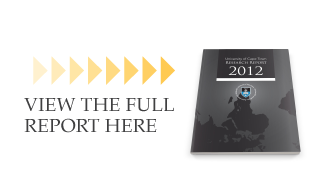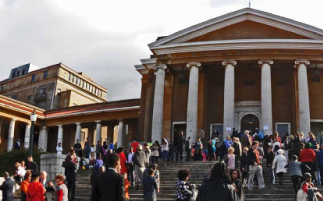 |
||
| The Research Office aims to further UCT’s vision of becoming a research-intensive university with a global reach. Through engagement with relevant parties, it operates as a pivot between academics and the external research environment, and helps to align research interest and expertise with institutional priorities, as well as national and international imperatives. |  |
|
The scope of activities includes expanding access to external funding opportunities and grants, developing and supporting proposals, administering a suite of internal grants through a proposal-driven, committee-managed process, accrediting and evaluating the university’s research groupings, tracking UCT’s research output and impact, managing researcher development programmes, fostering a culture of inter- and transdisciplinary research, forging new and strategic partnerships, and implementing the strategic projects of the University Research Committee. The office is currently organised into four units, with a fifth node envisaged for 2013, when the Office of Research Integrity will be established, which will work collaboratively with researchers and the relevant Senate ethics committees to promote responsible conduct of research, and further enhance the service-oriented ethos of the office.
Key to research success is the funding with which to undertake research. In a national funding landscape with rapidly diminishing resources, the Research Office invested in a database of funding opportunities that provides access to all funding opportunities for which researchers on the African continent are eligible. Research Professional Africa is a customisable database that provides researchers with access to information about funding opportunities specific to their own research areas. When the database was rolled out to the UCT community during 2012, subscriptions peaked at 550 by year end, with more than 3 000 international funding opportunities being made available to researchers. Furthermore, the Research Office provided substantive technical support to researchers applying for funding from the United States’ National Institutes of Health (NIH), which resulted in 20 such proposals being developed in 2012 with UCT as the applicant institution. On the national front, the Research Office actively provided assistance with 400 applications for funding and rating from the NRF.
In addition to supporting access to grants, another key priority is to help develop researcher capacity. The Research Office runs pioneering programmes to assist academics in furthering their profiles, in which all faculties participate.
The Emerging Researcher Programme (ERP) reached its tenth year in 2012 and continues to provide support that ranges from counselling by a programme co-ordinator to more structured mentorship sessions, as well as workshops and seminars. It awards modest grants through a developmental process of proposal writing and its impact is reflected in the rapid growth from 44 participants in its founding year to 548 by the end of 2012. Fifty-six joined in 2012 alone.
Through the Programme for the Enhancement of Research Capacity (PERC), the Research Office works with faculties, departments, and individuals to offer support to the more established researcher. Activities to support this sector of the research community include preparing staff to apply for NRF rating and/or re-evaluation, promoting inter- and transdisciplinary research, providing financial and intellectual support for Africa-based research and the production of Africa-centred knowledge.
The work of PERC and ERP is further complemented by Supervision Training and the Mellon Visiting and Retired Scholars Mentorship Project. The latter aims at giving further individualised support to young academics through structured mentoring organised within selected host departments that apply for such support through a competitive process. (Also see feature on research development initiatives at UCT, on pages 22–25).
The support provided by the Research Office is delivered within the framework of the university’s mission and also its research strategy. In collaboration with the International Academic Programmes Office, the office strives to realise UCT’s Afropolitan vision of playing a consistent and visible role on the continent that is in line with the university’s position as one of Africa’s leading universities. Already a recipient of the NIH’s International Extramural Associate Research Development Award (IEARDA), the office was awarded a supplementary grant that enabled collaboration with other IEARDA grantees to transfer their skills to research managers and administrators on the African continent. In conjunction with the University of Zambia, Moi University in Kenya and Mbarara University of Science and Technology in Uganda, workshops were conducted in Lusaka and Cape Town in 2012. The latter workshop, hosted by the Research Office, was attended by 38 delegates from 25 institutions in sub-Saharan Africa.
UCT’s relationship with international organisations plays an equally important role in fostering our engagement with the international research community. Such relationship-building is supported by the Research Office and happens in a variety of ways, including participation in formally structured bodies, such as the Worldwide Universities Network, as well as through formal agreements with strategically selected international partners where there is already evidence of strong and productive collaboration in a selected area. In 2012, special focus was given to partnerships with the International Centre for Education, Marine and Atmospheric Sciences over Africa, a joint initiative between several laboratories in South Africa and France, and the establishment of a consortium focused on social science research and PhD/researcher training with the London School of Economics and the universities of Ghana, Dar es Salaam, Ibadan, Makerere, and Nairobi.
Key to the success of each of the support structures is effective communication and the appropriate organisation and storage of knowledge. Information linking each of the above, coupled with an effective grants-management system, will soon be incorporated into an online Research Portal being developed in partnership with UCT’s Information and Communication Technology Services. There is also a concerted shift towards open-access platforms, with policies and structures currently under development to maximise open scholarship in the realm of research.
Over the last year in particular, and thanks to a very efficient and hardworking team, the Research Office has expanded its partnership with the research community. We salute our researchers and look forward to an excellent year of productivity ahead as we consolidate and build on these foundations.














